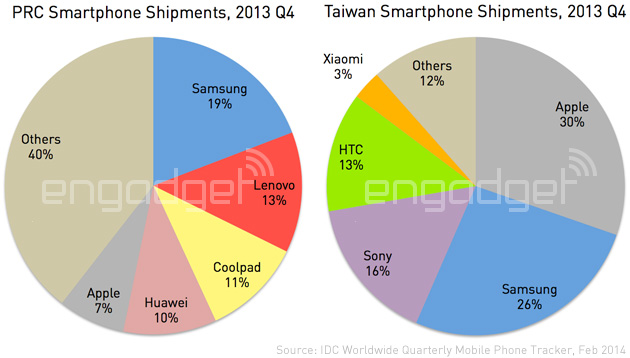
Total Pageviews
Monday, 17 February 2014
MOSS kits let you build the robot of your dreams with color-coded cubes

Korg's 'faithful recreation' of the ARP Odyssey analog synth is coming this September

Iberia planea sustituir los manuales de a bordo de sus pilotos por iPads
Estaba viendo el vídeo Electronic Flight Bag para pilotos acerca del proyecto que tiene Iberia para sustituir el mogollón de manuales y papeles que llevan sus pilotos en sus maletines por iPads, con el consiguiente ahorro de peso a bordo y gasto de combustible, amén de ser más sano para la espalda de los tripulantes…
Los maletines de un piloto pueden llegar a pesar 30 kg
Hasta que dicen que la Agencia Estatal de Seguridad Aérea tendrá que aprobar su uso.
Con lo que están tardando en aprobar el uso de dispositivos electrónicos personales a bordo, más de un mes y contando, les fío la cosa para largo.
via Microsiervos http://ift.tt/1jLUooL
There Is Now a 'Smartwatch' for Kids

Sony Xperia Tablet Z2 leaks hint at KitKat and an even thinner design

AllCast creator demos Android screen mirroring through Chromecast

Though Its Network Of Mentors, HackHands Offers Live Help For New Programmers
With sites like Codecademy and Stack Overflow, there are plenty of ways to learn programming and get help online — but there’s nothing like a live human being who can answer your questions and look at your code, according to the co-founders of a new website called HackHands.
One of those co-founders, Forest Good, described the site as an “Uber for programming” — in other words, it allows you can get programming help at the moment that you need it. The company has built out a global network of mentors, so Good said you should be able to visit the site at any time, describe the problem that you’re facing, and then get connected to a mentor within 15 minutes. The two of you are connected via video chat (powered by TokBox), and you can also work on the code together in a collaborative text editor (or just share the relevant screen on your computer).
Good said that there’s a “spectrum” of users that HackHands is targeting. On one end, there are people who have never coded before. On the other end, there are people who have just graduated from a programming bootcamp. Wherever they are on that spectrum, they’ll probably have moments when there are concepts or problems that they can’t figure out on their own, so they’ll appreciate talking to an expert.
For now, HackHands is focused on Ruby on Rails, and Good said all of its mentors are vetted based on both their communication and programming skills. (“I have a personal relationship with all of our experts, and we have some plans to scale that as well,” he said.)
Co-founder Geraldo Ramos said the goal is to offer something that’s both fast and affordable, with easy-to-understand pricing. HackHands charges $1 per minute for each session, although there’s a five-minute grace period where either party can back out without any charge — if, for example, the expert realizes that they can’t help with a specific problem or topic after all. Customers will also be able to tip based on their satisfaction. To offer further incentive for expert participation, HackHands will create leaderboards where the most active mentors are both celebrated and financially rewarded.
HackHands was created by 6PS Group, a web development agency that trying to move to more of an incubator model — if HackHands and subsequent projects are successful, 6PS plans to spin them off into separate companies.
via TechCrunch » Startups http://ift.tt/1gNMxDo
Motion-controlled Battroborg Warriors deliver armed robot combat

Fly Or Die: Beats Music
Beats Music is the latest of many streaming music services to hit the scene, pulling from some of the best parts of competing products to offer an excellent internet radio experience.
Once you offer up some likes and dislikes on various artists and genres, Beats then offers four separate menus for finding something to listen to.
The first is a “Just For You” tab that uses the information you’ve given to determine good playlists for you. Then, there’s the “Sentence” which works almost exactly like Songza, asking you to fill in a mad lib-style sentence with what you’re doing and how you feel. “Highlights” shows popular and trending playlists and a final search tab lets you search for playlists based on genre or artist.
The playlists themselves are really great — definitely on par with what you get from Songza or iTunes radio — as Beats compiles the playlists using real humans, not algorithms.
That said, it’s a semi-expensive service considering the competitions’ pricing. Beats Music costs $10/month, with a free week-long trial to get you started.
It’s an interesting entrant in the crowded space, but not sure it’s worth a $120 investment each year.
via TechCrunch » Startups http://ift.tt/1cRfcU1
Rock Band and Guitar Hero creators next game is Chroma, a free-to-play rhythm-based shooter (yes, really)

Plant-Based Food Startup Hampton Creek Foods Raises $23M Round Led By Horizons Ventures
It looks like investors think there’s a big opportunity in Hampton Creek Foods‘ mission of creating tasty, affordable alternatives to animal-based foods — the company is announcing that it has raised $23 million in Series B funding.
The round was led by Hong Kong businessman Li Ka-shing’s investment firm Horizons Ventures, with participation from Jerry Yang and AME Cloud Ventures, Ali and Hadi Partovi, Jessica Powell of Google, Scott Banister, and Ash Patel. Previous backers Khosla Ventures, Collaborative Fund, and Kat Taylor and Tom Steyers’ Eagle Cliff also invested in the new round.
“Everyone wants a clean and sustainable world and we love that Hampton Creek is committed to that goal – egg by egg,” Li said in the funding release.
As the quote implies, eggs are one of the key foods that Hampton Creek is trying to replace. I actually visited the company’s office about a year ago where I got to see the labs where different plant-based alternatives are developed and the kitchen where those alternatives are tested — and as you can see in the taste test at the end of the video below, I had a hard time telling the difference between cookies using traditional ingredients and the ones using Hampton Creek’s egg replacer.
Morgan Oliveira, the startup’s communications director, declined to share any sales numbers, but she did say that Hampton Creek is in the process of rolling out with six Fortune 500 companies. Other goals include launching its Eat the Dough product (which was featured on Katie Couric’s show) next month and its Just Scramble product this fall.
We’ve written about Hampton Creek as part the growing interest in the startup and VC world in reinventing food. When I asked Oliveira about this, she said:
I think people are starting to realize the way most food is produced doesn’t align with our values. They’re realizing that a lot of food is produced in a way that is bad for the environment, people, and animals.And that it’s just not a sustainable model. At Hampton Creek we also think that it’s incredibly unfortunate that the healthy choice is always the more expensive and inconvenient choice and we have made it our mission as a company to change that.
The company has raised $30 million total.
via TechCrunch » Startups http://ift.tt/1bdW9Io
The first limited edition PS4 is a regular PS4 with a gold sticker

Aiming To Be The Coinbase of Europe, Sweden’s Safello Raises Investment Cash
Billing itself as the “Coinbase of Europe” Sweden based Bitcoin company Safello has raised a $600,000 investment round lead by Bitcoin advocates Erik Voorhees (co-founder of the Bitcoin company Coinapult) and Roger Ver (Angel Investor & Bitcoin evangelist), and participated in by Blockchain.info CEO Nicolas Cary and angel investors Victor & Victor. The startup has also redesigned its site for usability to position itself as ‘safest way into Bitcoin’. The startup plans to go up against major competitors in the shape of Kraken, Bitstamp, Coinbase, and BTC-E.
The cash will be used to grow in Europe and to be a ‘safe harbour’ for Bitcoin. It’s estimated that about half of the Bitcoin exchanges have disappeared since 2009.
To achieve this, Safello has registered itself with the Financial Supervisory Authority in Sweden, a country that together with Germany has been pretty clear about bitcoin taxation, and, of course, a very stable economy.
Frank Schuil, co-founder and CEO of Safello says: “Our new interface is simpler than our competitors. And we are more ‘compliant’ than the others. Our goal is keep the user interface minimalistic so it’s simpler for people to get into bitcoins.” Erik Voorhees, says Safello’s growth “has been amazing thus far.”
Stability is key in the Bitcoin market but it is hard to find right now.
Bitstamp, the manager of the world’s largest bitcoin exchange, said over the weekend that it had restored automated customer withdrawals, after they were halted for days due to a hacking attack that crippled various Bitcoin platforms, including Kraken and others.
via TechCrunch » Startups http://ift.tt/1eIcCiX
Apple Eyes Cars, Medical Devices and Other News You Need to Know

¿Por qué son tan feos los coches de Fórmula 1 este año?
El Caterham CT05 pilotado por Robin Frijns el pasado 30 de enero en Jerez | Foto Caterham F1 Team
En Wired, Why Formula 1 Cars Are So Ugly This Year,
Este años los motores de Fórmula 1 son tan geniales como feos son los coches. Los monoplazas de este año tienen el aspecto de un oso hormiguero. Esa nariz caída se debe a la nueva norma de la FIA que establece que el morro del coche no puede superar los 185 mm de altura con el objetivo de reducir el riesgo para los conductores en caso de choque. El reglamento plantea un desafío para los diseñadores y especialistas en aerodinámica de la F1, que prefieren mantener el morro elevado para maximizar el flujo de aire bajo el coche. Tratar de aunar ambos requisitos tiene como resultados una gran variedad de diseños horrendos.
Otro cambio en las reglas requiere la eliminación de uno de los dos elementos del alerón trasero del coche y dirigir el flujo del tubo de escape lejos de los elementos aerodinámicas, por lo que este flujo de aire no se podrá utilizar para aumentar la carga aerodinámica.
Así que los coches este año tienen menos carga aerodinámica, el alerón delantero es más pequeño, no se puede trapichear con el flujo del escape, tendrán que usar menos combustible por carrera (un 60% menos que el año pasado), llevan motores así como de Prius,... Apasionante, oiga.
via Microsiervos http://ift.tt/1jvHBUn
Siemens Launches $100M Fund To Back Software Startups That Can Disrupt Manufacturing
Siemens Venture Capital, the corporate financing arm of Europe’s biggest engineering company, is launching a new, $100 million fund to back early-stage startups working in the areas of industrial automation and other digital technologies that can transform manufacturing. This comes after Siemens made two notable startup investments over past few months — in 3D visualization startup Lagoa, and CounterTack, the developer of next generation cyber security software.
Corporate venture capital has traditionally been considered “dumb money”, but as this TechCrunch post noted in November last year, some of them are increasingly looking more like traditional VCs. Indeed, in October 2013, 48 venture funding rounds valued at over $719M included CVC investor participation. This represented a 14% participation rate, the highest month in the CrunchBase dataset.
Engineering and manufacturing conglomerates such as Siemens and GE are increasingly looking at newer ways to leverage data and insights captured by their devices and machines. Combined with Internet and other digital technologies, this becomes what GE and several others describe as “the Industrial Internet.” As this NY Times story noted way back in November 2012, the lines dividing old-world engineering and new age software solutions are blurring. This shift is underscored by the rise of “Internet of Things”, where Google is beginning to look like General Electric, at least on the software side.
“As digitization and software are becoming increasingly important for manufacturers to compete in the global marketplace, the Industry of the Future Fund will support Siemens’ “Industrie 4.0” strategy by providing capital to those companies whose innovative technologies and vision have the potential to change the landscape of manufacturing and industrial automation,” said Siegfried Russwurm, CEO of the Siemens Industry Sector.
According to the company statement, this new fund will back start-up companies early in their lifecycle and aims to foster partnerships with companies, which will transform industrial markets or even create completely new ones through pioneering technologies .
We have requested Siemens to provide more specific details of this fund and will be updating after hearing from them.
via TechCrunch » Startups http://ift.tt/1cgAuh1
IDC: Samsung dominated Greater China smartphone shipments again in Q4 2013

Curated Shopping Service Outfittery Raises €13M To Improve Men’s Fashion Sense
Outfittery, a curated shopping service for men’s clothing, has raised €13 million in new funding to expand into other European markets beyond Germany, Australia and Switzerland where it currently operates.
The round was led by Germany’s Highland Capital Partners Europe, with participation from existing investors, including Holtzbrinck Ventures, Mangrove Capital Partners, High-Tech Gründerfonds, RI Digital Ventures and Kreativwirtschaft (the VC fund managed by IBB Beteiligungsgesellschaft).
Total funding for the Berlin-based startup is unknown, having perviously raised an undisclosed round.
Founded in 2012 by female entrepreneurs Anna Alex and Julia Bosch (women dressing men, now that’s disruptive!), Outfittery offers a curated online shopping experience for men’s clothes, using personal shoppers to curate customised outfits based on a shopper’s preferences, which they are then sent but only pay for what they keep.
The company has 100 employees, which includes 50 female “style experts” who power the personal shopper element of the service, and claims more than 100,000 customers.
Along with further international expansion, the company plans to use the investment to expand its men’s fashion line, so that it can continue to offer new curated outfits to its members. It currently offers clothes from 150 “high-quality” fashion brands.
via TechCrunch » Startups http://ift.tt/1guOUvp
The 10 Highest Rated Tech Companies for Internships

Este reloj escribe la hora en una pizarra, borra y la vuelve a escribir
El mecanismo del Time Plotting Clock controlado con Arduino además de escribir con un rotulador la hora sobre una pizarra blanca también pasa el borrador para limpiarla antes de volver a escribirla de nuevo. Y así tolrato.
via Microsiervos http://ift.tt/1dZCPcx
El guitarrista con 78 dedos
En The Verge, This robot band has a guitarist with 78 fingers,
La productora británica Warp Records publicará en breve un álbum interpretado totalmente por una banda de robots japoneses llamados Z-Machines. El guitarrista tiene 78 dedos, mientras que el batería utiliza 22 brazos para tocar. Los creadores de la banda se juntaron con el compositor Squarepusher con el simple objetivo de explorar la creación de música con robots y acabaron completando un álbum con cinco pistas.
Si viviste la época de la música Midi la música de los Z-Machines te sonará bastante porque es básicamente lo mismo, ahora con partes mecánicas en movimiento.
via Microsiervos http://ift.tt/1bEjXWg
LG Unveils Three L Series III Smartphones

Leyes para proteger la privacidad de los conductores
Aunque podríamos remontarnos décadas para encontrar situaciones similares, el hecho es que las últimas tecnologías incorporadas en los vehículos cada vez más conectados está comenzando a resultar inquietante para algunos. El hecho de que se puedan conocer –incluso prácticamente en tiempo real– la posición, velocidad y movimientos del vehículo y que haya también grabaciones de vídeo, cajas negras y otros dispositivos personales conectados es una situación relativamente nueva y a veces «incómoda».
Por eso durante el pasado Salón del Automóvil celebrado en Detroit (Estados Unidos) unas declaraciones de un directivo de Ford hicieron saltar la alarma de nuevo. Básicamente dejó caer que gracias al sistema de posicionamiento global (GPS) incorporado en los vehículos el fabricante era capaz de saber en todo momento dónde está exactamente un coche y cómo se mueve – incluso si infringe los límites de velocidad de ciertas carreteras. Posteriormente otros responsables de Ford han quitado hierro al asunto asegurando que esa información no se utiliza para «hacer seguimientos», sino para actualizar los mapas y otros servicios del vehículo y que no está ahí para compartirla con las autoridades o entidades de espionaje (como la Agencia de Seguridad Nacional) aunque, técnicamente, podría suceder.
De hecho una comisión del senado estadounidense sobre privacidad y tecnología recopiló en un informe todo sobre el estado de la cuestión a partir de la información proporcionada por los fabricantes. Prácticamente todos afirmaron ante los requerimientos legales que ciertamente recopilan información sobre la geolocalización y que además la comparten con otras empresas.
Entender el problema de privacidad en este caso es sencillo: incluso aunque no se supiera el nombre del propietario del vehículo, o su matrícula, no es difícil cruzar los datos para perfilar al conductor del coche o llegar a la persona concreta – hay empresas que se dedican a eso. Y no hace falta tener todos los datos para extraer algo de «inteligencia» de la información. Supongamos que se registra una visita a una ciudad lejana al domicilio habitual y luego a un local de alterne en la carretera. O una visita cada semana a la misma hora a una clínica de fertilidad. O que todos los domingos el coche se desplaza a la misma iglesia al mediodía. Se pueden inferir datos sobre nuestra vida privada, familiar y religiosa que muy probablemente nadie quisiera compartir con quien ha fabricado su automóvil.
Parte del problema además no solo es que los datos se guarden, sino que por el mero hecho de existir también existe la posibilidad de que alguien ajeno tenga acceso a ellos ilegalmente (desde dentro de las propias empresas, mediante sobornos o desde fuera por métodos maliciosos) y se haga con ellos para comercializarlos o darles usos inapropiados.
Las propuestas probablemente pasarán, como está sucediendo en Internet, por un mejor registro del tipo de datos que maneja cada vehículo, una información clara y directa de lo que el propietario puede esperar que suceda con ellos y una forma sencilla de decidir qué información puede querer compartir y cuál no. No es difícil imaginar que alguien permita que su coche sea rastreado en un mapa durante un viaje de vacaciones por si hay alguna emergencia –pero quizá no a diario– o el tiempo que deben permanecer los vídeos que graben las cámaras de aparcamiento, sistemas de conducción autónoma o registros de viaje, quizá 24 horas. Los fabricantes deberán además comprometerse a vigilar eficientemente todos esos datos y a no compartir esa información sin permiso explícito, como ya es habitual en otros servicios de características tecnológicas similares.
{Foto: Ford}
via Microsiervos http://ift.tt/1bchemq

